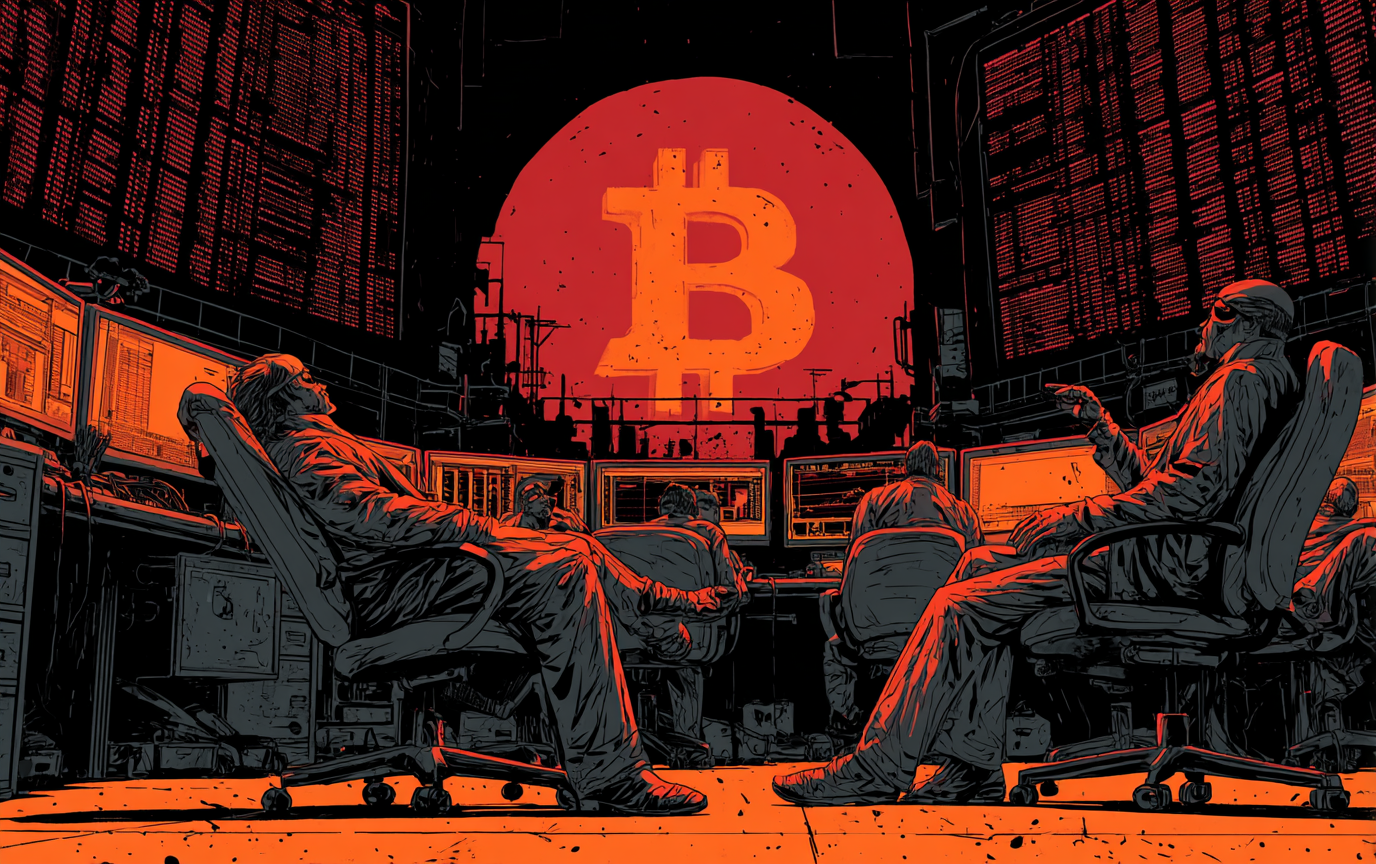The Recent Moment Washington Realized, Blockchain Isn’t the Enemy—It’s the Blueprint

Jason Dussault
Chief Executive Officer, Co-Founder

This Post is disseminated on behalf of Intellistake Technologies Corp.
I didn’t expect to wake up to the U.S. Treasury Secretary quoting Bitcoin’s uptime like a tech analyst …but it finally happened.
“Bitcoin never shuts down.”
Scott Bessent, the man overseeing America’s financial bloodstream, just said the words: “Seventeen years after the white paper, the Bitcoin network is still operational and more resilient than ever. Bitcoin never shuts down. @SenateDems could learn something from that.”1
It wasn’t just a compliment. It was a signal, a quiet surrender of sorts.
For years, Washington treated Bitcoin like a virus in the financial system. Something to isolate, monitor, and hopefully contain. But containment doesn’t work on an idea. Especially not one that’s been running flawlessly for nearly two decades while entire governments reboot themselves every few years.
This wasn’t just another headline; it was an inflection point. The first real moment where authority looked at autonomy and didn’t see a threat …it saw a benchmark.
The Point of No Return

There’s a moment in every technological revolution where the establishment stops fighting and starts imitating. That’s where we are now.
For all its volatility, its noise, and its mythology, Bitcoin has achieved something few institutions ever have: it’s never failed. No maintenance windows. No recessions. No “temporarily unavailable” screens. Just block after block, verified, recorded, and broadcasted to the world.
The traditional financial system, by contrast, has become a patchwork of fragility; prone to outages, debt ceilings, and political paralysis. In a single sentence, Bessent accidentally captured why Bitcoin matters: it works. Always.
And once people in power start acknowledging that kind of reliability, the conversation shifts forever.
This isn’t about Washington suddenly becoming “pro-Bitcoin.” It’s about the quiet realization that control and stability are no longer synonymous. For a century, we’ve built systems that relied on trust. Bitcoin replaced that with truth; math and consensus, immutable and self-sustaining. Once you understand that difference, it’s impossible to unsee it.
The System Is Changing — With or Without Permission

We’ve seen this before. The internet disrupted media. Open-source software replaced proprietary monopolies. Decentralized networks, in time, replaced institutions too rigid to adapt. Each time, the same pattern unfolded: rejection, resistance, acceptance, imitation.
Bitcoin follows that pattern; only this time, it’s not information being democratized, it’s value itself.
Governments can regulate exchanges, tax profits, even shape narratives, but they can’t turn the network off. It doesn’t belong to any country, and it doesn’t depend on human compliance to function. That’s what makes it so profound, and so difficult for traditional systems to digest.
At Intellistake, that’s where our attention has always been: on the infrastructure that can’t be stopped once it starts. The kind of systems that prove their strength not in rallies, but in reliability. Networks that outlast market cycles because they’re not built around speculation …they’re built around survival.
The irony, of course, is that while the political class debates Bitcoin’s legitimacy, they’re already building systems that mimic it. Tokenized assets. Blockchain settlement layers. “Programmable” currencies. Everyone’s trying to replicate the resilience without surrendering control.
But you can’t selectively decentralize. You either build open systems, or you build bottlenecks with better branding.
The Slow Merge

To me, what Bessent’s post really signaled wasn’t endorsement; it was envy. A recognition that in an age of failing institutions, Bitcoin’s consistency has become aspirational.
And that’s what this moment represents: a pivot, not in policy, but in perception. When the world’s most powerful monetary official cites a decentralized network as an example of endurance, it tells you the narrative has matured.
Bitcoin’s relevance is no longer confined to traders or technologists. It’s become part of the institutional vocabulary; and that changes everything. Because once you frame it as infrastructure instead of investment, the debate about legitimacy is over.
It’s not just about money anymore. It’s about designing systems that don’t collapse when humans do.
That’s why, at Intellistake, we’ve positioned ourselves where technology meets trust, helping to build infrastructure that can endure political, financial, and even cultural volatility. Decentralized networks aren’t just more transparent; they’re more human-proof. They operate by design, not by decree.
And in an era defined by uncertainty, that might be the most valuable feature of all.
The Blueprint Ahead

History rarely announces its turning points. Sometimes they look like tweets...
Bessent’s comment might read like a footnote in the news cycle, but it’s the kind of shift that echoes. The financial establishment is no longer laughing at Bitcoin; it’s taking notes. Because beneath the volatility, beneath the headlines, the network keeps doing something no other system has managed: it stays online.
That’s the quiet revolution underway. Governments, banks, and corporations are beginning to see that resilience isn’t born from control; it’s born from letting systems run as they were designed to.
Bitcoin is the proof of concept. Decentralized infrastructure is the next phase.
And whether policymakers like it or not, the blueprint has already been written.
At Intellistake, we’ve been building for that world all along; one where trust isn’t granted by authority but earned by architecture.
So yes, the Treasury Secretary finally said it out loud.
“Bitcoin never shuts down.”
Neither will what comes next…
For education only, not investment advice. Any forward-looking points are my views today, may change, and include risks.
Disclaimer
There has been significant volatility in digital assets and their value can decline rapidly, which in turn would lead to a decline in the stock price of companies holding digital assets. Intellistake is a start-up that does not have the same access to capital as other larger more established companies.
Intellistake has just commenced operating its business and is at an early stage of development. Intellistake is entering this space by acquiring and operating blockchain validator hardware that supports AI networks and investing in AI-related digital tokens to primarily operate validator hardware.
Intellistake is developing custom AI software systems called "AI Agents" for businesses. It recently announced the development of IntelliScope, a newly designed enterprise artificial-intelligence (AI) suite that applies decentralized AI technologies to deliver transparent and verifiable corporate intelligence. IntelliScope, which is in testing, is being publicly introduced as Intellistake's enterprise AI suite, reflecting the Company's focus on advancing practical applications of decentralized AI technologies.
The IntelliScope suite is being developed as a collection of modular AI agents, each intended to address specific enterprise challenges. Development has advanced through internal closed testing, where functionality is being refined and validated. Built to leverage decentralized AI technologies developed within the ASI Alliance FET token ecosystem, IntelliScope is now preparing to move into closed beta testing with an enterprise client, a phase focused on gathering feedback to shape premium features and expand real-world use cases.
The Company intends to deliver these solutions either as one-time projects or ongoing subscription services. Revenue is expected to come from implementation fees and monthly subscription payments. The Company does not presently have any customers. Intellistake is just commencing operations. It is targeting significant growth but its business is subject to several risks related to general business, economic and social uncertainties; the sufficiency of cash to meet liquidity needs; legislative, political and competitive developments; the inherent risks involved in the digital currency and general securities markets; the volatility of digital currency prices and the additional risks identified in the "Risk Factors" section of the Company’s filings with applicable securities regulators. Intellistake has not yet developed or commercialized its AI solutions.
This report contains "forward-looking information" concerning anticipated developments and events related to the Company that may occur in the future. Forward looking information contained in this report includes, but is not limited to, all statements in respect of the Company's growth and development, the operations and business segments of the Company, expectations regarding the market for gold, digital currencies and decentralized AI, expectations for infrastructure to support digital currencies,support for decentralized AI and blockchain networks, a broader strategy to grow the Company’s position in AI and tech digital assets, revenue generation potential and details regarding staking and validator operations.
In certain cases, forward-looking information can be identified by the use of words such as "expects", "intends", "anticipates" or variations of such words and phrases or state that certain actions, events or results "may", "would", or "might" suggesting future outcomes, or other expectations, assumptions, intentions or statements about future events or performance. Forward-looking information contained in this report is based on certain assumptions regarding, among other things, the Company will continue to have access to financing until it achieves profitability; the technology and blockchain industries in which the Company intends to focus its business in will grow at the rate and in the manner expected; the ability to attract and retain qualified personnel; the success of market initiatives and the ability to grow brand awareness; the ability to distribute Company's services; the Company creates strategies to mitigate risks associated with cryptocurrency price fluctuations; the Company remains compliant with all applicable laws and securities regulations; the Company engages and collaborates with local experts, as necessary, to address jurisdiction-specific matters and ensures compliance with foreign regulations to avoid penalties; the Company addresses any potential cybersecurity threats promptly and effectively; the AI Agent technology can be developed and deployed with real world applications; and the ability to successfully deploy the new business strategy as a result of the change of business. While the Company considers these assumptions to be reasonable, they may be incorrect.
Forward looking information involves known and unknown risks, uncertainties and other factors which may cause the actual results to be materially different from any future results expressed by the forward-looking information. Such factors include risks related to general business, economic and social uncertainties; failure to raise the capital necessary to fund its operations; inability to create strategies to mitigate the risks associated with cryptocurrency price fluctuations; risks relating to the ability to develop the AI Agent technology and relating to the deployment of validator operations; the ability to acquire digital tokens at reasonable acquisition prices; the costs of regulation in the digital asset industries increase to the extent that the Company is no longer generating sufficient returns for shareholders; failure to promptly and effectively address cybersecurity threats; insufficient resources to maintain its operations on a competitive basis; and the actual costs, timing and future plans differs expectations; legislative, environmental and other judicial, regulatory, political and competitive developments; the inherent risks involved in the cryptocurrency and general securities markets; the Company may not be able to profitably liquidate its current digital currency inventory, or at all; a decline in digital currency prices may have a significant negative impact on the Company's operations; the Company's success may depend on the continued involvement of key personnel, including advisors, whose involvement cannot be guaranteed; institutional adoption of decentralized AI infrastructure remains uncertain and may not occur at the pace or scale anticipated; evolving regulatory frameworks, including those related to AI (such as Canada's proposed Artificial Intelligence and Data Act), may impose additional compliance burdens or restrict certain business activities; valuation figures are based on publicly available market data and internal assessments at the time of the referenced transactions and may not reflect current or future valuations; the volatility of digital currency prices; the inherent uncertainty of cost estimates and the potential for unexpected costs and expenses, currency fluctuations; regulatory restrictions, liability, competition, loss of key employees and other related risks and uncertainties; delay or failure to receive regulatory approvals; failure to attract qualified personnel, labour disputes; and the additional risks identified in the "Risk Factors" section of the Company's filings with applicable Canadian securities regulators.
Although the Company has attempted to identify factors that could cause actual results to differ materially from those described in forward-looking information, there may be other factors that cause results not to be as anticipated. Readers should not place undue reliance on forward-looking information. The forward-looking information is made as of the date of this report. Except as required by applicable securities laws, the Company does not undertake any obligation to publicly update forward-looking information.





